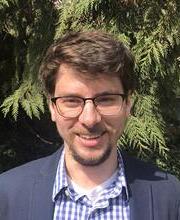
Matthew P. Johnson
E-mail: mpj16@georgetown.eduPronombres: He/Him/His
Posición: Postdoctoral Fellow
Afiliación institucional: Princeton University
Departamento: High Meadows Environmental Institute
País/Región: Brazil, Caribbean, Puerto Rico, All Latin America and the Caribbean, LAC in the World
Época: Twentieth Century, Twenty-First Century/Contemporary
Sub-áreas: Environment, Technology, Public Health
Palabras clave:
PhD, Environmental History, Georgetown University, May 2021
Cargos desempeñados:
Adjunct Professor, History, Geogetown University, 2021-2022
Environmental Fellow, Harvard University Center for the Environment, 2022-2024
Environmental Fellow, Princeton University High Meadows Environmental Institute, 2024-
Sobre mi:
Matthew P. Johnson is an environmental historian whose main research area is energy in modern Latin America (with emphasis on Brazil and the Caribbean).
His first book, Hydropower in Authoritarian Brazil, is about the social and environmental impacts of the Brazilian military dictatorship’s big dams. In light of the anthropogenic climate crisis and the urgent need to divest from fossil fuels, historical research about the footprint of low-carbon energy (i.e., renewables) is important to inform a just energy transition. To date, hydropower has spared the Earth’s atmosphere more carbon emissions than any other sources of low-carbon energy, and Brazil is one of the world’s biggest producers of hydropower. However, Brazil’s dams are also some of the world’s most controversial, with massive social and environmental impacts that fell hardest on Indigenous communities.
He is currently writing chapters for his second book, which is an environmental history of oil refining in the Caribbean. During the twentieth century, many island governments welcomed oil refining as a means of industrial growth and access to cheap fuel. The region boasted some of the world’s biggest refineries, which brought immense benefits to companies, consumers, and local governments. However, these facilities also produced deleterious and long-lasting health and environmental impacts.
He has also published two articles and a scholarly blog post on irrigation dams in Puerto Rico, and has ideas for future research projects related to both anthropgenic climate change and mining.
His teaching interests are world history (especially global environmental history), Latin American environmental history (especially Brazil and the Caribbean), global energy history (especially fossil fuels and electrification), global health and disease history (especially infectious disease and industrial pollution), and the history of anthropogenic global warming.
Libros:
Artículos:
Otros recursos o proyectos:
“Puerto Rico’s Ageing Dams,” White Horse Press blog, March 2021.
Curriculum vitae digital: View here